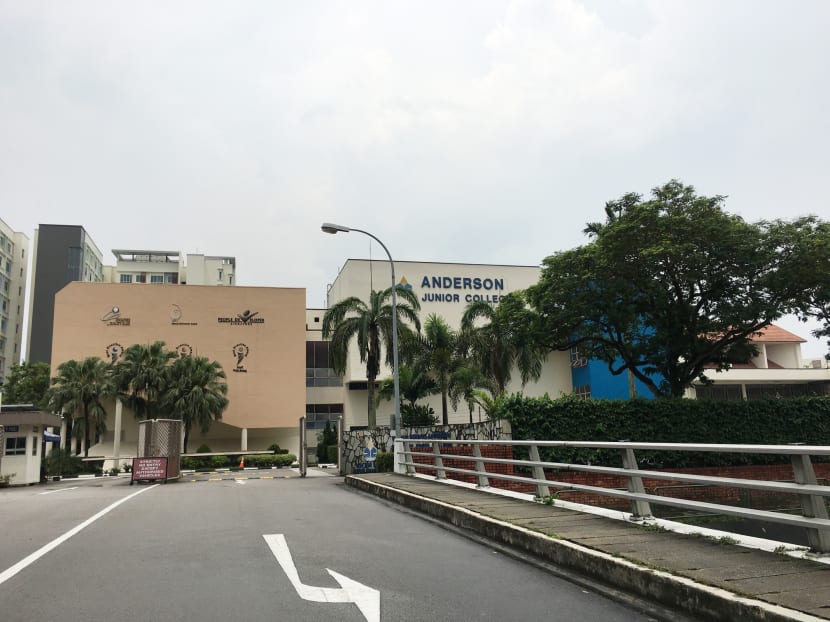AJC hostel to close by 2019: MOE
SINGAPORE — Anderson Junior College (AJC) will become the latest school to shut down its hostel, as demand for boarding places continue to fall and there are fewer international students in schools here, the Ministry of Education (MOE) told TODAY.

Anderson Junior College (AJC) will become the latest school to shut down its hostel, as demand for boarding places continue to fall and there are fewer international students in schools in Singapore, said the Ministry of Education (MOE).
SINGAPORE — Anderson Junior College (AJC) will become the latest school to shut down its hostel, as demand for boarding places continue to fall and there are fewer international students in schools here, the Ministry of Education (MOE) told TODAY.
The AJC hostel site would be returned to the Singapore Land Authority in 2019, due to a “lower demand for places” and after discussions with the school, the ministry said, adding that it reviews plans for school hostels regularly.
The closure is “still more than a year away”, its spokesperson said, but did not give an exact date. When the time comes, arrangements would be made to help the remaining boarders find alternative accommodation, the spokesperson added.
At the end of last year, the hostels of Catholic Junior College (CJC) and River Valley High School already closed its doors.
Figures from the Immigration & Checkpoints Authority (ICA) show that as of end-August, there were about 76,000 international students on Student’s Pass who are enrolled in private and government-run schools and institutions, including the polytechnics and universities in Singapore. In 2008, the number stood at close to 100,000, previous reports stated. The ICA issues the Student’s Pass for foreigners applying to study here.
Asked whether the ministry had turned away more applicants in the last few years and about the intake of foreign students, MOE would only say that international students form about 5 per cent of the total student population in the last few years.
On the other hand, the number of scholars from Asean (Association of South-east Asian Nations) admitted to schools here has “remained stable”, it added.
A resident at AJC hostel, who declined to be named, said the students were left shocked and uncertain after being informed of the news earlier this week by the hostel management.
She said it was also “especially surprising”, given the hostel was relatively new and located in a central location. “If (the authorities) already had the knowledge that we have falling enrolment projections…why build the hostel in the first place when this was going to happen?.. It doesn’t make sense.”
It was very disruptive, especially for other foreign students who had traveled so far from home, only to hear that their own living arrangements “suddenly had to change in an unexpected manner,” she said.
Former students who were boarders were not surprised by the news that yet another hostel is closing.
Communications consultant Agung S Ongko, 28, said that there had been debates in the past about tightening the tap of foreign-talent flow here. “Back then, there was already talk that the number of foreign scholars could be reduced,” he recalled.
Mr Agung spent about nine years at Catholic Junior College’s hostel and said that it was his “second home”, where there was a strong sense of camaraderie. Some of his closest friends now, he met them there, and they became his “extended family”.
He had stayed in the hostel for four years when he moved from Indonesia to Singapore to further his studies at age 13, and later put up there for another five years during his university years, in his role as a resident mentor.
“I wanted to give back... to reconnect with the younger scholars, and guide them with things like learning English, choosing universities, and charting their next path in life.” Mr Brian Leonal, 26, who works in the information services industry, noted that the batches of foreign students had increasingly shrunk over the years. He was at the CJC hostel between 2006 and 2010.
He remembered staff members there being caring towards students, accompanying him to the clinic when he was sick, whipping up tasty meals, and even including them in the festivities when the students could not afford to return home during Christmas season. They knew it would be a lonely time “for kids like us”, Mr Leonal said.
The admission of foreign students in schools here were addressed in the latest Parliament sitting on Monday (Oct 2). Ms Low Yen Ling, Parliamentary Secretary for Education, told the House that about 1,800 applications from international students to enter Primary 1 this year were rejected in the 2016 Primary 1 registration exercise.
She added that while the MOE values the diversity these foreign students bring to mainstream schools, the priority is to serve the needs of Singaporean students. There is “a limited number of places” offered to international students each year, she said.
Over the last few years, school fees for foreign students have been increased substantially. Last October, it was announced that non-Singapore citizens at government and government-aided schools would go up, in a continued effort to “differentiate fees by citizenship”.









